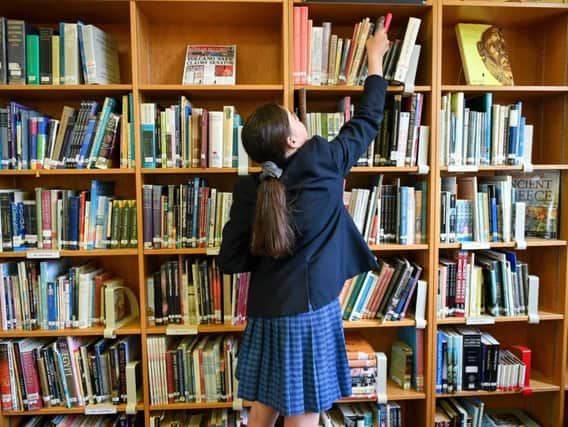One in eight schools has no library


Around one in eight schools do not have a library, with poorer children less likely to have access to one than their richer peers, according to a study.
Primaries are less likely to have a dedicated library space than secondary schools, and in many cases, libraries are being used as classrooms or meeting rooms rather than for their original purpose.
Advertisement
Hide AdAdvertisement
Hide AdCampaigners are warning there is an "inequality of access and opportunity" that needs to be dealt with so all children can benefit from what a school library has to offer.
The study, based on a survey of 1,750 schools across England, Wales and Northern Ireland, found that 87 per cent have access to a designated library space, meaning about one in eight do not.
The survey also shows discrepancies between rich and poor - 91 per cent of schools that have between none and 9 per cent of pupils eligible for free schools meals - a key measure of poverty - have a library area.
This drops to 81 per cent among schools where 25 per cent to 49 per cent are eligible for free dinners, and to 56 per cent where half or more pupils are eligible. Only 12 schools in this final category took part in the survey.
Advertisement
Hide AdAdvertisement
Hide Ad"These findings indicate that pupils in schools with a higher proportion of free school meals are less likely to experience the range of positive benefits a school library can provide," the report said.
Kay Walton, Schools Library Service manager for Hull which provides books and library resources for schools, said while in the past schools were given a dedicated budget from government to pay for their libraries, under the academy system, business managers can choose to spend this money on other things.
“Some schools with business managers don’t look at the quality -- it’s all about money. They buy other things instead of books, like whiteboards or laptops. Sometimes it's even out of the headteacher’s hands.”
Hull has one of the few Schools Library Services in Yorkshire have closed through reduced demand from schools which have cut back on books.
Advertisement
Hide AdAdvertisement
Hide AdFiona Brady, chair of the Yorkshire and the Humber School Library Association said most school librarians in the region had seen a cut to their budgets. "A lot more money is being spent on IT and libraries are seen as less important to business managers," she said.
Research has shown the benefits include improving reading and writing skills, more enjoyment of reading and improving general academic achievement, the study said.
Ms Brady added that the benefits of an adequately-funded school library extend beyond the academic. The Yorkshire group also helps train librarians to help children with mental health issues and information literacy, for example, spotting fake news.
A breakdown shows schools in England were most likely to have a library, at 90 per cent, dropping to 67 per cent in Wales and 57 per cent in Northern Ireland.
Advertisement
Hide AdAdvertisement
Hide AdA total of 96 per cent of secondaries said they had a school library, compared with 85 per cent of primaries.
More than half of school libraries were reported to be used as a classroom for non-library lessons, and a similar proportion were used for meetings.
A third of schools said pupils continued to have access to the library space while it was being used for an alternative purpose.
The survey was commissioned by the Great School Libraries campaign, a three-year project which aims to ensure all children have access to a decent school library.
Advertisement
Hide AdAdvertisement
Hide AdNick Poole, chief executive of CILIP, a library and information association, said: "On the one hand, [the research] is a testament to the head teachers, teachers, governors and librarians that value and promote the importance of school libraries for learners and their school.
"On the other hand, the research paints a picture of inequality of access and opportunity and insecure employment that we cannot accept.
"The findings highlight the urgency of securing national school library strategies and investment in England, Wales and Northern Ireland, drawing on the example of Scotland."
A Department for Education spokesperson said: "We want all children to have the opportunity to read widely - that's why we've strengthened the national curriculum to focus on developing reading skills, and increased the focus on phonics to help children acquire the basic building blocks of reading.
Advertisement
Hide AdAdvertisement
Hide Ad“School libraries play a role in this and schools are responsible for deciding how to provide this service for their pupils. We recently announced an investment of £14bn more in schools over the next three years to 2022-23, allowing schools to invest more in teachers and resources – such as library provision – to ensure all children get the top quality education they deserve.”